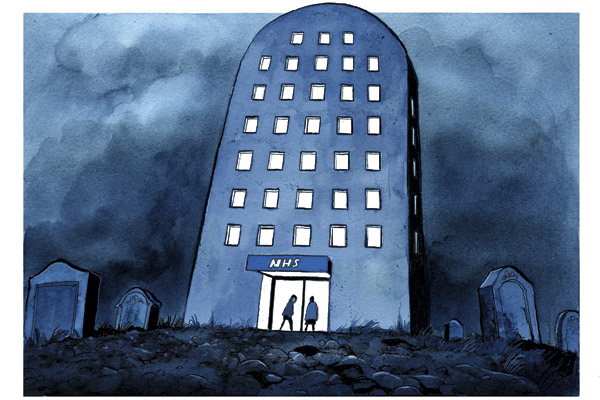Is the NHS in crisis, or isn’t it? Jeremy Hunt doesn’t want to use the word, telling the Today programme that ‘there’s a huge amount of pressure’, while Norman Lamb argued that ‘I wouldn’t describe it as a crisis’ but ‘I readily acknowledge that the system is under intense pressure’. Few politicians want to describe something they’re notionally responsible for as ‘in crisis’ (though Lamb isn’t afraid to use pretty strong language about some areas of his portfolio, including mental health). But whatever word they use, ministers know that things aren’t hunky dory in accident and emergency departments at the moment – and this hasn’t been a cold winter.
The problem for politicians, particularly those on the opposite side who want to say that this is the government’s crisis, is that the crisis has many causes. They often do, which is why they turn from spots of bother into crises, because people don’t realise that when spots of bother combine, they turn into a big ugly crisis that suddenly looks unmanageable. The College of Emergency Medicine says the 111 line is sending more people to hospital and that staff are suffering from burnout and then leaving to work in other disciplines or other countries. Jeremy Hunt likes to talk about Labour’s GP contract that allowed doctors in General Practice to opt out of out-of-hours work. Doctors point out that the shift patterns in A&E put them off from even applying for the jobs in the first place because they make it very difficult to sustain normal sleep patterns, let alone a family or a relationship – which is why there are so many vacancies in this discipline long before those working in it have even started feeling fed up and in need of a career change. Mary wrote last year in the Spectator about the pressures on the ambulance service.
And on top of all of that, there’s the stat from the hospitals declaring major incidents that 30 per cent of the people coming in to their A&E departments don’t need to be there. Some of those will have been referred by an anxious 111 operator, some will have struggled to get an appointment with a GP about something that they think is more serious than it is (and though doctors find it tempting to blame people for being ignorant and assuming that every jab of pain in their chest is a heart attack rather than a strained intercostal muscle, it is hardly fair to blame someone who hasn’t spent six years at medical school for not knowing what’s wrong with them – and anyone who knows student doctors will know that they’re always diagnosing themselves with rare conditions they’ve just learned about in their textbooks too), and some will be the sort of annoying people who think they’re entitled to A&E care for something that even they know is trivial. Others will be there because they need emergency treatment as a result of drinking too much. And others still will be there because – hoorah – we’re all living longer but with complex medical needs.
What a lot of spots of bother to solve. Whether or not there is a crisis or a lot of pressure or whatever convenient phrase that most suits ministers, those spots need solving. The problem for politicians who like things to be simple is that not all of them involve a nice eye-catching announcement of more money, or indeed simply blaming another party for making bad decisions. And when we’re in a General Election campaign, anything that isn’t simple tends to fall by the wayside rather.







Comments